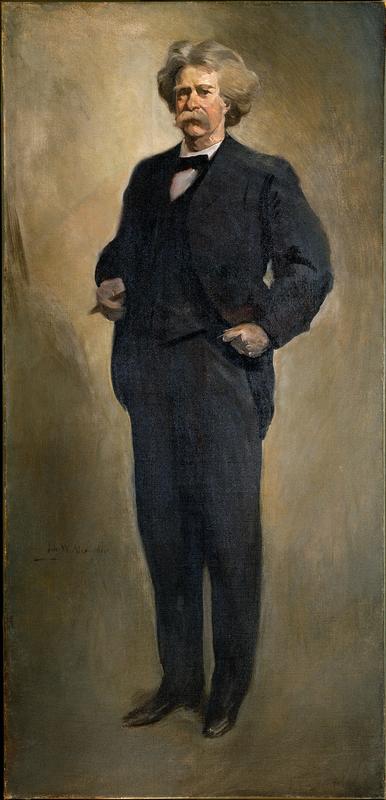More about Samuel L. Clemens (Mark Twain)

Contributor
John White Alexander may have been the only artist to depict in perfect detail the disarray that is Mark Twain’s hair.
As it turns out, Mark Twain, whose actual name is Samuel L. Clemens, was both the great American novelist and the great American stylist. In his New York Times obituary, they spoke of his mane: “It is a legend that he was vastly proud of his famous mop of white hair, and used to spend the pains of a court lady in getting it to just the proper stage of artistic disarray,” which, ironically, totally matched his personal and professional life. Death and misfortune pock-marked Twain’s life, beginning with the death of his father, followed by the death of half of his siblings, one of which died on a steamboat - the one on which Twain suggested he work.
Twain made several bad investments which led him to bankruptcy. He lost $200,000 on an automatic typesetting machine and then decided not to invest in Alexander Graham Bell’s telephone. Then death struck again and claimed his daughter Susy in 1896, his wife in 1904, and another daughter in 1909. It was a sad life, but being a genius and maybe the best American writer ever hopefully softened the blow.
Yes, he still managed to write some of the best American novels in history, namely The Adventures of Tom Sawyer and The Adventures of Huckleberry Finn, which have inspired the writing of people like Ernest Hemingway, who said that “All modern American literature comes from one book by Mark Twain called 'Huckleberry Finn.'” This seems like a mildly sweeping statement but Hemingway wasn’t one for overstating anything, so we’ll take it. Kurt Vonnegut also said of Huckleberry Finn, that Twain “flabbergasted himself by writing a novel as comically profound as the masterpiece 'Don Quixote' … How the heck did he do that?"
Twain, the astounding writer, also grew a lot as a person throughout his career. For instance, when he started writing his work was pretty racist, and by the end of his career it wasn’t. Personal growth! You may find this a bit of a stretch, but Twain can be thanked in part for helping end segregation. (Stay with me here.) Twain “contributed to the college expenses of two or three black students. One who went to Yale [Warner T. McGuinn] went on to become a mentor to Thurgood Marshall,” the lawyer responsible for the Brown vs. Board of Education Supreme Court decision. Many a high school classroom debate centers around whether or not Twain was racist but we have yet to throw Twain’s work out of the high school reading canon, which says a lot in and of itself. Twain himself said, “when you find yourself on the side of the majority, it is time to pause and reflect.” He was pretty smart I guess.
Sources
- Greenblatt, Alan. "Why Mark Twain Still Matters." Npr.org. N.p., 2010. Web. 23 July 2018.
- "Mark Twain Is Dead At 74." Archive.nytimes.com. N.p., 1910. Web. 20 July 2018.
- "Mark Twain Quotes - Brainyquote." BrainyQuote. N.p., 2018. Web. 20 July 2018.
- Nix, Elizabeth. "8 Things You May Not Know About Mark Twain." HISTORY. N.p., 2014. Web. 20 July 2018.
- "Portrait Of Mark Twain By John White Alexander | National Portrait Gallery." Npg.si.edu. N.p., 2018. Web. 20 July 2018.
- Ulin, David L. "Celebrating The Genius Of 'Huckleberry Finn'." latimes. N.p., 2010. Web. 23 July 2018.











